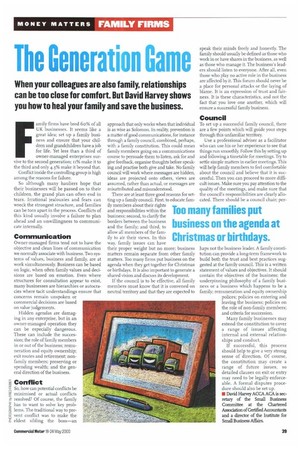The Generation Game
Page 41

If you've noticed an error in this article please click here to report it so we can fix it.
When your colleagues are also family, relationships can be too close for comfort. But David Harvey shows you how to heal your family and save the business.
Family firms have bred Go% of all UK businesses. It seems like a great idea; set up a family business and ensure that your children and grandchildren have a job for life. Yet less than a third of owner-managed enterprises survive to the second generation; II% make it to the third and only 4.3% make it beyond that,
Conflict inside the controlling group is high among the reasons for failure.
So although many hauliers hope that their businesses will be passed on to their children, the grand plan can often end in tears. Irrational jealousies and fears can wreck the strongest structure, and families can be torn apart in the process. Conflicts of this kind usually involve a failure to plan ahead and an unwillingness to communicate internally.
Communication
Owner-managed firms tend not to have the objective and clean lines of communication we normally associate with business. Two systems of values, business and family, are at work simultaneously. Business can be based on logic, when often family values and decisions are based on emotion. Even where structures for consultation appear to exist, many businesses are hierarchies or autocracies where tacit understandings ensure that concerns remain unspoken or commercial decisions are based on value judgements.
Hidden agendas are damaging in any enterprise, but in an owner-managed operation they can be especially dangerous. These can include the succession; the role of family members in or out of the business; remuneration and equity ownership; exit routes and retirement; nonfamily members; preserving or spending wealth; and the general direction of the business.
Cannot
So, how can potential conflicts be minimised or actual conflicts .E? resolved? Of course, the family has to want to solve key problems. The traditional way to prevent conflict was to make the I_ eldest sibling the boss—an approach that only works when that individual is as wise as Solomon. In reality, prevention is a matter of good communications, for instance through a family council, combined, perhaps, with a family constitution. This could mean family members going on a communications course to persuade them to listen, ask for and give feedback, organise thoughts before speaking and practise both give and take. No family council will work where messages are hidden, ideas are projected onto others, views are assumed, rather than actual, or messages are misattributed and misunderstood.
There are at least three good reasons for setting up a family council. First, to educate family members about their rights and responsibilities within the business; second, to clarify the borders between the business and the family; and third, to allow all members of the family to air their views. In this way, family issues can have their proper weight but no more; business matters remain separate from other family matters. Too many firms put business on the agenda when they get together for Christmas or birthdays. It is also important to generate a shared vision and discuss its development.
If the council is to be effective, all family members must know that it is convened on neutral territory and that they are expected to
speak their minds freely and honestly. The family should usi Li fly be defined as those who work in or have shares in the business, as well as those who manage it. The business's leaders should listen to everyone. After all, even those who play no active role in the business are affected by it. This forum should never be a place for personal attacks or the laying of blame. It is an expression of trust and fairness. It is these characteristics, and not the fact that you love one another, which will ensure a successful family business.
Council
To set up a successful family council, there are a few points which will guide your steps through this unfamiliar territory.
Use a professional adviser as a facilitator who can use his or her experience to see that things run smoothly. Follow this by setting up and following a timetable for meetings. Try to settle simple matters in earlier meetings. This will help family members to feel comfortable about the council and believe that it is successful. Then you can proceed to more difficult issues. Make sure you pay attention to the quality of the meetings, and make sure that the council's responsibilities are clearly allocated. There should he a council chair; per
haps not the business leader. A family constitution can provide a long-term framework to build both the trust and best practices suggested at the family council. This is a written statement of values and objectives. It should contain the objectives of the business; the underpinning philosophy of a family business or a business which happens to be a family; remuneration and equity ownership polices; policies on entering and leaving the business; policies on the role of non-family members; and criteria for succession.
Many family businesses may extend the constitution to cover a range of issues affecting internal and external relationships and conduct.
If successful, this process should help to give a very strong sense of direction. Of course, the constitution may create a range of future issues, so detailed clauses on exit or entry may need to be legally enforceable. A formal disputes procedure should also be set up.
• David Harvey ACCA ACA is secretary of the Small Business Committee at the Chartered Association ofCertified Accountants and a director of the Institute for Small Business Affairs.








































































































